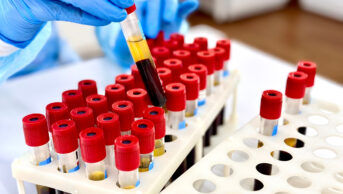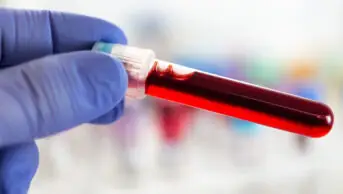Haemoglobinopathies, including sickle cell disorder (SCD) and thalassaemia, are inherited blood disorders that affect the function of haemoglobin, the oxygen-carrying protein in red blood cells. Individuals with SCD can experience acute complications — most notably painful vaso-occlusive crises (VOCs) — which accounted for approximately 14,000 hospital admissions in England between 2023 and 20241 — as well as longer-term complications. In thalassaemia, profound anaemia can occur, where some people are dependent on blood transfusions to survive. These conditions disproportionately affect individuals from global majority communities, presenting complex challenges for patients and healthcare systems alike. As advances in personalised care emerge, specialist pharmacists are increasingly central to improving outcomes in haemoglobinopathy care.
People with haemoglobinopathies have long faced significant health disparities, which could be attributed to underinvestment, racial bias or limited training of healthcare professionals2. Substandard treatment in emergency departments and inpatient settings can lead to reduced trust in healthcare providers, while many patients may avoid hospital care altogether. In 2021, the All-Party Parliamentary Group on Sickle Cell and Thalassaemia and the Sickle Cell Society published a report — ‘No one’s listening: an inquiry into the avoidable deaths and failures of care for sickle cell patients in secondary care’ — following an inquiry into avoidable deaths and failures for those with SCD. Key findings included a lack of awareness of SCD among healthcare professionals, inadequate care provided to patients in acute services and general wards, and non-adherence to national standards, as well as underlying racism among those providing care.
In many UK hospitals, haemoglobinopathy patients are often reviewed by clinical pharmacists, with varying levels of training and experience. The development of specialist haemoglobinopathy and SCD pharmacists across primary and secondary care aims to enhance the quality of care, provide expert medicines optimisation and has been welcomed by members of the haematology team.
The advent of novel therapies marks a ground-breaking milestone for haemoglobinopathy treatment in England. Exagamglogene autotemcel, a CRISPR/Cas9 gene therapy, modifies the patient’s own stem cells to reactivate synthesis of foetal haemoglobin by editing DNA and reducing the activity of the BCL11A gene. In September 2024, the National Institute for Health and Care Excellence (NICE) approved exagamglogene autotemcel for transfusion-dependent β-thalassaemia patients without a sibling matched stem cell donor. Ongoing clinical trial data from a CLIMB-THAL-111 & CLIMB-131 long-term study showcased 98.1% of patients becoming transfusion independent3. In January 2025, NICE extended the approval to patients with severe SCD, experiencing recurrent VOCs, without a sibling-matched stem cell donor. The ongoing CLIMB-131 study currently shows that 90% of patients remain free of severe VOCs for ≥12 months following treatment with exagamglogene autotemcel4. Further clinical trials into novel therapies for haemoglobinopathies and inherited anaemias, such as pyruvate kinase deficiency, are ongoing.
Since 2021, targeted investment by NHS England, and more recently, the London integrated care boards into haemoglobinopathy care, has accelerated the growth of specialist pharmacists. It has also laid the early groundwork for developing a national Red Cell Pharmacist Network, which is aimed to facilitate shared learning, service innovation and exchange of best practice across hospital and community sectors.
We deem that specialist haemoglobinopathy pharmacists are well-positioned to enhance therapeutic outcomes, promote medication adherence for treatments, such as hydroxycarbamide and iron chelators, and support patient-centred services that can meaningfully reduce health inequalities within this clinical space. This change across both community and hospital sectors represents a meaningful step towards enhanced visibility and ensuring improved clinical outcomes for haemoglobinopathy patients.
With September marking Sickle Cell Awareness Month — a global call to action focused on raising awareness of the complexities of SCD — we encourage pharmacy professionals to engage with our letter and deepen their understanding of this condition. Sickle Cell Awareness Month is aimed to educate healthcare professionals on the challenges of living with this chronic condition and to promote equity in healthcare.
Our group firmly believes that continued investment in education and specialist training is vital to delivering high-quality, equitable care. We hope this letter contributes to ongoing efforts to raise the profile of haemoglobinopathies within pharmacy practice.
For pharmacy professionals interested in expanding their clinical knowledge, the NHS offers a Sickle Cell Disorder National Education Programme, freely available via its e-learning platform.
Noushin Yadollahi-Farsani, lead pharmacist in sickle cell at Imperial College Healthcare NHS Trust
Meera Patel, highly specialist pharmacist in sickle cell, South East London Enhanced Sickle Cell Community Care Team, Guy’s and St Thomas’ NHS Foundation Trust
Nisha Nakrani, community haemoglobinopathies pharmacist, North Central London Community Red Cell Service at Whittington Health NHS Trust
Stephen Amoah-Nyako, sickle cell and thalassemia lead pharmacist, Sandwell and West Birmingham Hospitals NHS Trust
Rachel Lloyd, lead haemoglobinopathies pharmacist, University Hospitals Bristol and Weston NHS Foundation Trust
Ibnath Hussain, haemoglobinopathies pharmacist, North East London at Barts Health NHS Trust
- 1.Hospital admitted patient care activity 2023–24 . NHS Digital . 2024. https://digital.nhs.uk/data-and-information/publications/statistical/hospital-admitted-patient-care-activity/2023-24
- 2.No one’s listening: an inquiry into the avoidable deaths and failures of care for sickle cell patients in secondary care. All Party Parliamentary Group on Sickle Cell and Thalassaemia, Sickle Cell Society. 2021. No one’s listening: an inquiry into the avoidable deaths and failures of care for sickle cell patients in secondary care
- 3.Locatelli F. Durable clinical benefits and improvement of tissue iron markers with exagamglogene autotemcel in patients with transfusion-dependent β-thalassemia: results from the CLIMB THAL-111 trial . EHA. 2025. https://library.ehaweb.org/eha/2025/eha2025-congress/4159568/franco.locatelli.durable.clinical.benefits.and.improvement.of.tissue.iron.html
- 4.Frangoul H, Locatelli F, Sharma A, et al. Durable Clinical Benefits with Exagamglogene Autotemcel for Severe Sickle Cell Disease. Blood. 2024;144(Supplement 1):4954-4954. doi:10.1182/blood-2024-204001


